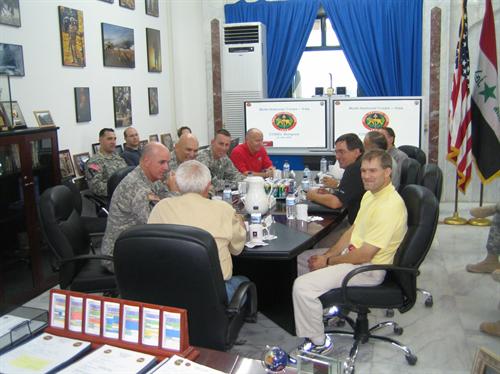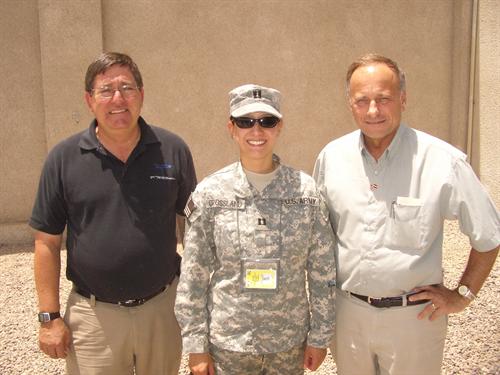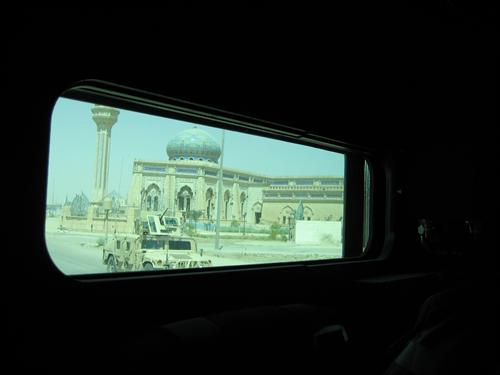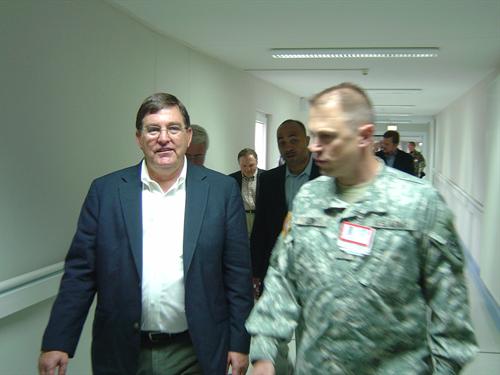Daily Journal: News from Iraq
IRAQ,
July 21, 2007
21 July 2007 At the third week of July 2007 the story is still a very mixed report. My overall impression from this latest trip is that significant successes have occurred and are likely to continue to occur as far as returning control of the country to the government and delivering it out of the hands of criminals and murderers. At the same time it is still a very dangerous situation, and the sacrifice is very real. The future is vastly different depending upon the outcome here. A stable country, with a representational government, able to act as a partner for peace in the Middle East, would be vastly preferable to a lawless land ruled by terrorists and providing a base for training operations with a source for funding further enlargement of their activities. Almost without question, the divergent future was on the minds of almost everyone I talked to during the two-day trip. Certainly America's best interest is going to be served by stability in that country with their active participation in stabilizing a very troubled region. It has been just over a year since I last traveled to the country of Iraq. A lot has changed both at home and in the country of Iraq during that time. There is no question that the news reports coming out of Iraq have been almost universally pessimistic for about 10 months time. I was obviously very concerned about what I would encounter upon my return. The trip was made over a weekend, a Saturday and a Sunday, a very condensed time frame with a great deal to see. It started at 2 a.m. at the military airport in Kuwait City. Our group loaded on a C-130 for the flight into Baghdad. The plane was cramped and fully loaded. In spite of the early hour it was already 90°. The plane contained a large number of soldiers and Marines who were returning to Baghdad. Because of the very early hour and the loudness of the aircraft there was not much conversation. But after the plane landed and the engines were stopped, there was a brief time where conversation was possible. For most, this was their second or third rotation. Their deployments have been extended to 15 months and most would not go home for almost a year. When several who were standing next to me learned who I was, there was suddenly an eagerness for conversation. Since February there was a change in how they did their work. Now, many were placed alongside Iraqi soldiers in smaller groups around the town. No longer attached to the larger and more protected base, the soldiers were clearly seeing a greater amount of activity, and it concerned them. I spoke, in some depth, with the man in front of me. Indeed he had 10 months left in his rotation, and he sometimes wondered if the generals knew what they were up against in their deployment. He complained about the long hours in the heat. He complained about being separated from his family. He had been reading a book on the plane, and I asked him about this. It was a book about philosophy. Assuming he would be leaving the Army at the end of his deployment I asked him what his plans were for next year. I assumed he would be returning to school or perhaps he had a job waiting for him. He looked at me strangely. “I just signed up for five more years” was his terse reply. We left the plane and parted ways. He was getting in an armored convoy, and we were loaded into Black Hawk helicopters for the next leg of our trip. It was still very early morning and the sun was barely breaking through the low dust layer that always seems to hang over Baghdad in the summer, and the temperature was already nearly 100°. But in many ways my conversation with this soldier underscored the ambiguities, the inconsistencies and the incongruous nature of life in Iraq. Over the next 48 hours we would see stories of great heroism and great hope. At the same time the frustration of buying time and space for a young government of a war-torn country was underscored at several junctures. From a military perspective, success has been made and continues to be made on a near daily basis. Indeed the primary enemy, Al Qaeda, has not only been beaten but also vanquished every time there has been an encounter. And because of the increased military activity, encounters have been more frequent. At the same time, a very young government seems to already have developed entrenched bureaucracies because of the centralized nature of their government. As military successes are happening around the country, aid from the central government is slow to he dispatched. As is probably the case with any other conflict in our nation's history, there are widely distributed data points and someone can take one or two of these to make virtually any argument that one wishes to make. It takes more discipline to analyze data and look at trendlines, but this is a discipline that must be exercised. The City of Ramadi, in the Al Anbar province of western Iraq, was the first stop for us on Saturday. This is a city the size of Fort Worth, Texas. One year ago when I was in Iraq, Ramadi was held up by insurgent representatives of Al Qaeda. In July of 2006 there would have been no way to travel to this city as it would have been seen as too dangerous a mission. But things began to change last February. The historic tribal leaders began to clearly understand that life alongside Al Qaeda was not going to improve, and in a stunning reversal, the town leaders began to seek out and embrace American protection. Popular support was no longer available to Al Qaeda in a city that had been destined to be the provincial capital of the resurgent Caliphate. This represented a striking strategic failure for the enemy. Their shadow government which had intended to establish a capital of a radical Islamic state was forced out of the city and indeed armed attempts to retake control were successfully rebuffed. People in the town began identifying where the terrorists lived, who was making the bombs and who was putting their daily lives in jeopardy. Now the task is to rebuild a basis of civil society. The municipal government has some significant tasks ahead of it. Their ability to clear rubble, to reestablish basic services such as water or electricity or sewer, and to prevent economic stagnation will be critical in preventing the type of unrest that could allow resurgence of the violence. Because of the distance from Baghdad and the central government there has been some isolation and significant efforts have been made by the Army to ensure that the local mayor has the ability to provide for his citizens. This underscores one of the difficulties ahead for this country. As areas are reclaimed and stabilized, the central government must be able to quickly provide the financial and security support that will be required to continue his early success. This also underscores one of the important recognized benchmarks, that of the holding of provincial elections. During the electoral process two years ago most of the Sunni population was involved in an electoral boycott. They now see the fundamental error of that decision and are eager to see new elections held that well permit more popular representation. After two or three years of serious brutality at the hands of Al Qaeda, the population now sees Americans as helpers and protectors. The tribal leaders originally feared the Americans as occupiers, but they have now come to understand that the Americans have no such interests. The same could not be said for the Al Qaeda interests. Their clear intent was to hold the town for their own purposes for the foreseeable future. The point was made during our visit that there are no overnight solutions to the problems in Iraq. Leadership cannot be bought and this has to be an evolutionary change, but this change can occur if the right environment is provided. As if to underscore the recent success of Ramadi we were taken out of the military base down the main street of town into the marketplace. We were permitted to walk freely in the marketplace and observe the many items for sale in what appeared to be a very normal Arab open market. The evidence of a combat effects on the town were all around us, but there was also evidence of active reconstruction as there was a crew working on the sewer line in the middle of the street as we walked through town. Again the incongruous scene of destroyed and bombed out buildings a block away contrasted sharply with the families with children we saw inspecting the wares of the Ramadi market. |
Latest from twitter
Get the most up to date news from me on Twitter.














